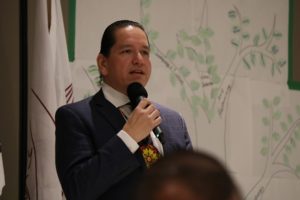Opinion: Citizens supportive of Anishinabek Governance

NIPISSING FIRST NATION– There are a number of grassroots Anishinabek Nation citizens who are supportive of moving past the shackles of the 1876 Indian Act. They will support the impending ratification of the Anishinabek Nation Governance Agreement (Governance Agreement).
Yesterday, a handful of citizens protested the forward movement represented by the Governance Agreement. Some participants even spoke openly about their support of the status quo. The Governance Agreement, developed in consultation with leaders and citizens of First Nations across Ontario, has been in negotiation for nearly 25 years.
“This Agreement represents a first step to get out of the Indian Act that has kept us in shackles for over 150 years,” said Bob Goulais, an Anishinabek citizen from Nipissing First Nation.
He and his family, as well as his community leaders, are all supportive of the Governance Agreement.
“I’ve yet to see any real evidence or analysis that will dissuade me from supporting the Agreement,” says Goulais. “Most of the opposition is motivated by fear, anger and mistrust of their fellow Anishinabek. Clearly, for some, the Indian Act and colonialism is still a comforting, security blanket. That is what we should be concerned by.”
According to Goulais, there is an opportunity to create Anishinabek law-making authority and enhance federal funding in four different areas: selection of leaders (elections), language and culture, citizenship, and operations of government.
“We have never had an opportunity to enable governmental systems and processes to determine our own citizens or to revitalize our language and culture. That’s something that was taken away from us. The Indian Act is silent in these areas.”
According to Goulais, the concern over language loss should be front-of-mind to all Anishinabek people. A 2018 socio-demographic study indicates that Anishinaabemowin language use is now limited to less than a dozen Anishinabek Nation First Nations.
“This Agreement will give us the ability to create new and effective laws so we can learn and use our language. It will allow us to invest in our culture. This is truly a watershed opportunity that we cannot pass up.”
One of the exciting opportunities is to explore the development of traditional governance systems, like the Anishinabek Clan System. This system empowers clans, or families, to play a role in leadership and civic responsibility according to customary practices. At one time, this was outlawed by Canada and replaced by the current Chief and Council system.
“For me, this is about the potential for transformative change. We’ve been saying for generations that we need to get rid of the Indian Act. The opportunity is now before us.”
Throughout the ratification process underway this February, Goulais has challenged all Anishinabek citizens to learn more about the Agreement and the potential for self-government.
Additional Resources:
Video Statement: https://youtu.be/xOql6DN7mig
Opinion: https://youtu.be/z9aYoPdwwkM
About the Anishinabek Nation Governance Agreement: www.governancevote.ca
Contact:
Bob Goulais
E-mail: info@bobgoulais.com
Phone: (416) 770-8567

